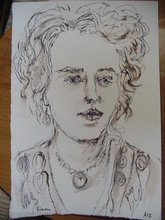Thursday, February 25, 2010
On Graham's "Eve" because it has nothing to do with the essay in which I wrote it
Not becoming the garden, but thrown out of it, Eve presents Graham with an opportunity to meditate on the dangers and virtues of change/life/transgression and inevitability. In “Eve,” the poet works through the expansion of moments as a symbol of being captured. The view of Eden is that it was a place of innocence, but also of a radical servitude and limitation manifest as dollorous boredom: “Still noon: it is not clear how much / this green, looked-out upon, / tumbling towards the eye to land is dressed,” and “All day the green, / a sound like silk unspooling from the bolt.” In this unchanging green noon, Eve toys with the idea of change before the apple, the “Just now: like a feeling / behind one’s back.” She’s heard the “small, hissing if, oh if…” and responds almost unconsciously by playing with the gate to the garden, “I step through. I step back.” A shift in perspective leaps away from Eve’s subjectivity to some abstracted summary of the story of the fall: “Bless, blame, transvaluate— / Change context— / Unexpect context.” Through that transvaluation abstracting the fall into a coined paradox, “unexpect,” condensing Eve’s wish for a break in monotony, the real disruptive gesture of the the poem emerges in that it uses the inevitability of the story—the choice, the explusion—as forgiveness. Rendering calamity on a personal scale, Adam is reported to say yes to her offer because “he knew / the deliberate anti-climax/ by heart” and almost gently commands her, “disorder my clothing, / count my ribs, / hide your face.” ---- PMRSC
Subscribe to:
Post Comments (Atom)

No comments:
Post a Comment